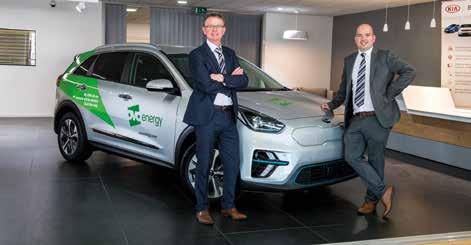
3 minute read
Vauxhall Vivaro-e
Versatile Vivaro-e leaves its electric rivals trailing
Andrew Walker
Advertisement
Alongside sister brands Citroen and Peugeot, Vauxhall brought the Vivaro-e to market in 2020. Thanks to Covid-19, we didn’t get to drive one until February of this year, when a Vivaro-e Elite 3100 75kWh turned up so CC&V could see what all the fuss is about.
The all-electric Vauxhall Vivaro-e looks pretty much the same as a diesel Vivaro and comes in two trim levels – Dynamic and Elite – and two lengths, L1H1 and L2H1. There’s also two bodies, Van and Double Cab and with two battery sizes, 50kWh or 75kWh. Vauxhall claims the larger battery will cover 205 miles – and it’s likely to be the preferred choice.
The good news is the battery’s presence doesn’t stop it lugging some serious loads. Payload ranges from 1,000kg on the L1H1 Elite Panel Van 3100 with the 75kWh battery, rising to 1,226kg on the L1H1 Dynamic Panel Van 3100 with the 50kWh battery. Uniquely in the market for all-electric LCVs, Vivaro-e is capable of towing up to one tonne.
The electric motor produces 136hp (100kW) and 260Nm of torque. The 50kW battery powered Vivaro-e offers 144 miles of all-electric range in WLTP conditions, including a half payload, while the larger 75kW battery offers 205 miles of range. With an average annual fleet mileage of 20,000 miles, both battery sizes are built to cope with the daily weekday mileage of 76 miles.
As far as charging time goes, 100kW charging capability is available as standard, so if you are lucky enough to charge your Vivaro-e this way, rapid charging of the 50kW battery from zero to 80 per cent takes just 32 minutes, while rapid charging on the 75kW battery takes 48. The onboard charger is 7.4kW, so charging at home on the most common 7.4kW wall box will take 11 hours and 20-minutes. Three-phase 11kW charging is available as an option, so if you have the more powerful wall box then this would speed things up.
Either option comes well specced, with the Dynamic featuring auto transmission with e-toggle shift; electric parking brake; electronic stability programme with traction control; ABS with electronic brake force distribution; hill start assist; driver and front passengers’ airbag and remote control central deadlocking.
Elite adds a driver drowsiness alert system, a panoramic rear-view camera, SatNav, a Head-up display, Lane Departure Warning, front parking sensors, autonomous emergency braking, 17” alloys and metallic paint.
Access to the load area comes via a nearside and offside sliding doors and twin solid rear doors. Elite versions add the Vauxhall FlexCargo load-through bulkhead, so longer items can slide under the front passenger seat. The cabin has some decent storage space as well, with large door pockets, a dash top lidded compartment, two corner-dash mounted cup holders, an open glove box, with extra storage space located under the passenger seat.
On the road put it in Eco mode and sit back and relax. On the motorway select cruise control and settle in at 60mph or below to best conserve battery range. If you can resist the temptation to go above 60mph whilst on the motorway, you’ll see a return of one mile of distance travelled for one mile of range used.
Even though the Vivaro-e is nippy, especially from a standing start, around town, or on A and B roads, the battery range improves. As you slow down more often, the brake regeneration kicks in more regularly and you can idle up to junctions and roundabouts while the battery recharges. We found that if you travelled 40 miles like this, you’d only use 27 miles of the van’s range.
CC&V VERDICT
Doesn’t carry or tow as much as its diesel counterpart, but as far as electric vans go, the Vivaro-e IS the leader of the pack.
N N N N










